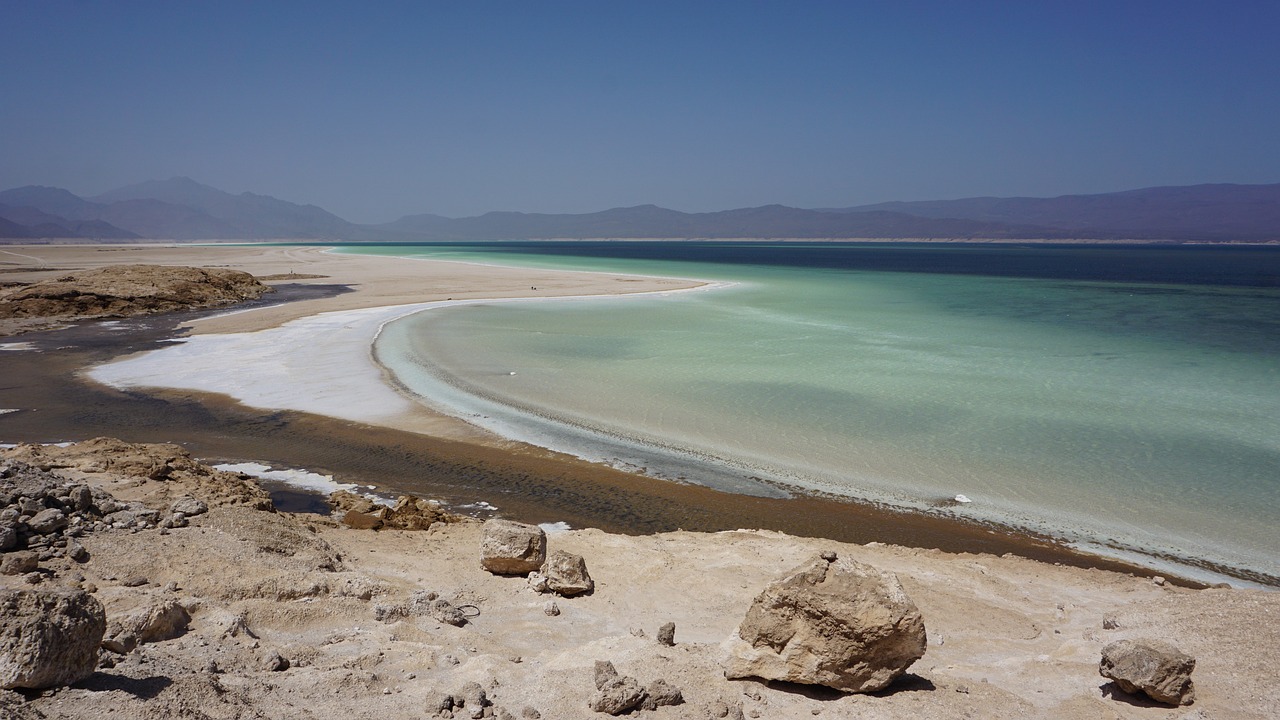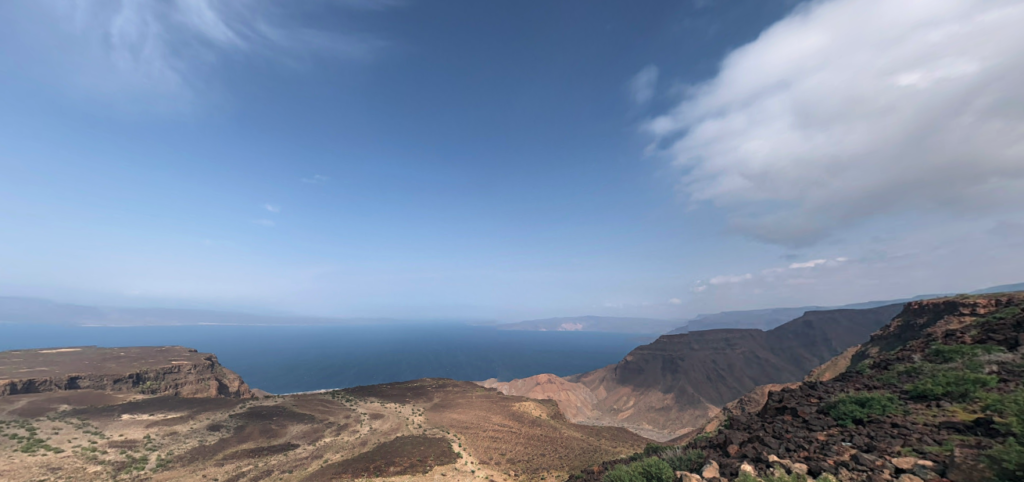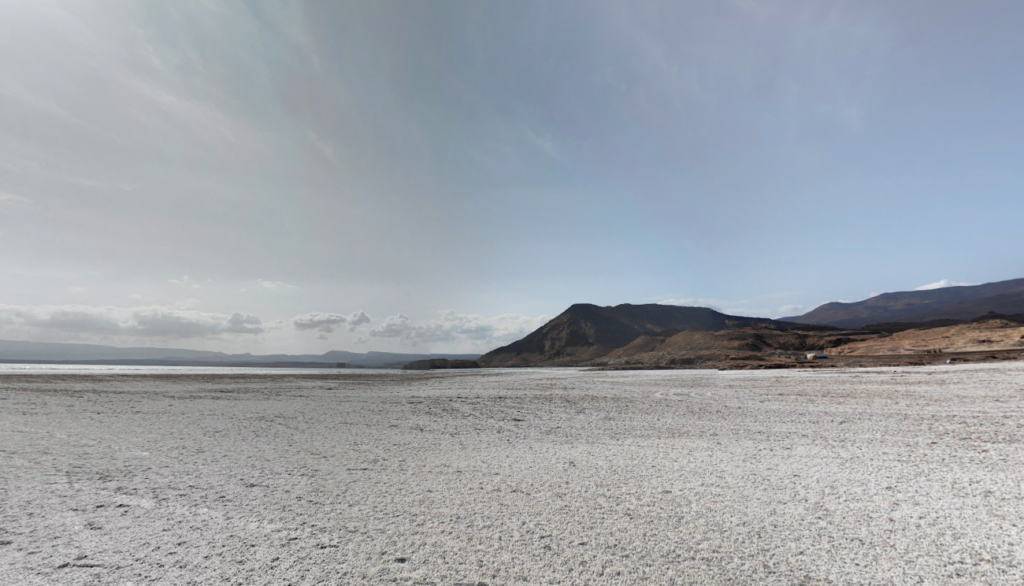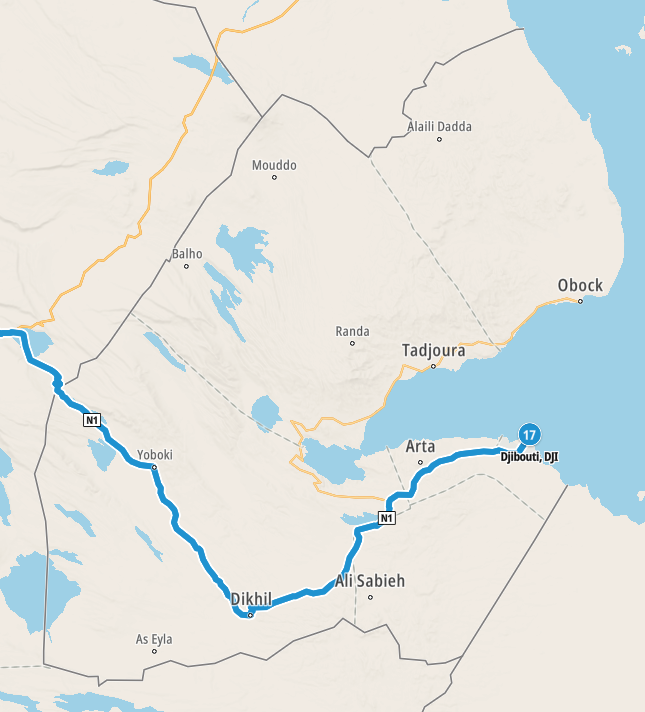Djibouti – Let’s explore here

What’s it like in Djibouti?
Djibouti is the smallest country in Africa, being slightly larger than Wales, UK. Its names in its other official languages are / République de Djibouti / جمهورية جيبوتي / Jamhuuriyadda Jabuuti / Gabuutih Ummuuno. It’s mainly a land of deserts and mountains, the highest point being Mousa Ali, at 6,631 ft (2,021 m) above sea level.
It has a very long history, with early hominid remains abundant throughout the country. It became an independent state in 1977, and shares land borders with Eritrea, Somalia and Ethiopia.
The population of Djibouti is just over one million people (2024), about ¾ of whom live in the capital, Djibouti City. Sitting on the Red Sea coast, it serves as a major commercial port.
The amazing Lake Assal, a volcanic crater that lies 509 ft (155 m) below sea level, is located in the centre of the country. It is the lowest point on land in Africa and the third lowest point on Earth after the Sea of Galilee and the Dead Sea in Israel and Jordan. It is also the fifth most salty lake in the world, ten times saltier than the sea.

A bit about the history of Djibouti
Early History and Indigenous Groups
The area that is now Djibouti has been inhabited for thousands of years by various ethnic groups, including the Afar and the Issa, both of which still make up the majority of the population today. The region’s strategic location at the entrance to the Red Sea and the Bab el-Mandeb Strait made it an important centre for trade and cultural exchange. Historically, the area was influenced by the ancient Egyptian, Arabian and Ethiopian kingdoms, with trade routes passing through Djibouti connecting Africa, the Arabian Peninsula and Asia.
Colonial Period and French Rule
In the late 19th century, European powers scrambled to colonise Africa. France established its presence in the region in 1862 by signing a treaty with the local sultans. Over time, France expanded its influence, and in 1888, it formally made the area a French protectorate, naming it French Somaliland. The region’s strategic location, especially for maritime trade, made it valuable to the French. During this period, the French built the port city of Djibouti, which became a major shipping hub.
Path to Independence
After World War II, nationalist movements began to grow across Africa, demanding independence from colonial powers. In the 1940s and 1950s, political movements advocating for greater autonomy emerged in French Somaliland. In 1958, the territory became an overseas territory of France, and a referendum was held, which resulted in the establishment of a local assembly. Over the following years, tensions grew between the Afar and Issa peoples, who had differing views on the future of the region. On 27 June 1977, French Somaliland finally gained full independence and became the Republic of Djibouti.
Early Years of Independence and Political Tensions
Upon independence, Hassan Gouled Aptidon became the country’s first president. His government, initially welcomed for ending French rule, faced internal challenges due to the country’s ethnic divisions and regional tensions. Djibouti’s political landscape was dominated by the ruling People’s Rally for Progress party, led by Gouled. However, the Afar minority, which felt marginalised, began to oppose the government, and tensions between the Afar and Issa communities led to occasional outbreaks of violence.
Civil War and the Effects of the Ethiopian Conflict
In 1991, the situation worsened when the Front for the Restoration of Unity and Democracy, a rebel group mainly composed of Afar, launched an armed insurgency against the government. The civil war was fought for several years, with intermittent peace talks and ceasefires. The war ended in 1994 with a peace agreement that granted greater political representation to the Afar minority. Despite this, Djibouti continued to face challenges related to ethnic and political tensions, as well as the instability of neighbouring countries, particularly the Ethiopian–Eritrean conflict.
Recent Developments and Political Stability
Since the end of the civil war, Djibouti has remained politically stable, largely due to its strong military and strategic importance. President Hassan Gouled Aptidon served until 1999, when he was succeeded by his long time ally Ismail Omar Guelleh, who has been in power since. Guelleh has maintained a tight grip on the country’s political system, with opposition groups often facing restrictions. Djibouti has remained a one party state with regular elections, although there have been criticisms of electoral fairness and political freedoms.
Strategic Importance and International Relations
The country is home to several foreign military bases, including those from France, the United States and China. The port of Djibouti is crucial for trade and maritime security in the region. The country’s proximity to the Bab el-Mandeb Strait, a key global shipping route, has also made it a key player in regional security, particularly in relation to the war in Yemen and maritime piracy in the Gulf of Aden.
Modern Djibouti
Today, Djibouti’s economy is centred around port services, logistics and international trade. The country also benefits from foreign investment due to its strategic location. However, despite its economic advantages, Djibouti faces challenges, including high unemployment, poverty and a reliance on external assistance. The political environment is often criticised for limited opposition participation and restrictions on civil liberties. Nonetheless, Djibouti has maintained relative stability compared to many of its regional neighbours and continues to play a vital role in the Horn of Africa.

Djibouti road trip
Our Djiboutian road trip is part of a much larger African road trip.
Map of our planned road trip through Djibouti

Our current planned road trip takes us from Ethiopia towards the capital, Djibouti City, before moving onto Eritrea and Somalia.
No doubt we’ll explore the country much more than this continent-spanning short route shows, in particular checking out coastal Djibouti.
Hopefully our journey will improve our knowledge of this intriguing and beautiful country, and enable us to meet some interesting people. We’ll be updating this page at that time – don’t forget to check back 🙂
What’s it like to drive in Djibouti?
They drive on the right hand side of the road in Djibouti. In the main, roads are poor, with many being unsurfaced dirt tracks. Driving standards are also poor.
Do you require an international driving permit in Djibouti?
We’ve created a dedicated page to driving abroad, which answers this question, and more, which you might find helpful.
Can you use your UK driving license when driving through Djibouti?
We’ve created a dedicated page to driving abroad, which answers this question, and more, which you might find helpful.
Do I need a carnet de passages to drive in Djibouti?
We’ve created a dedicated page to driving abroad, which answers this question, and more, which you might find helpful.
What currency do they use in Djibouti?
In Djibouti they use the Djiboutian franc. Cash is widely used. The use of credit / debit cards is not widely accepted outside of the capital. Travellers cheques are not readily accepted. There are very few ATMs outside of the capital.
You should make yourself aware of the amount that your bank charges you for using credit and debit cards abroad. Often credit cards are cheaper for purchasing items directly, and for withdrawing cash from ATMs.
What language do they speak in Djibouti?
They mainly speak Somali and Afar in Djibouti. Although Arabic and French are the official languages, and are spoken widely.
What time zone is Djibouti in?
Remember, when you’re planning your next trip to take a look at what time zone it’s in.
Do I need a visa to visit Djibouti?
We’ve created a dedicated, more comprehensive page on visas, which you should find helpful. Check it out!
Is wild camping legal in Djibouti?
Yes, wild camping is fine in Djibouti.
What plug / socket type do they use in Djibouti?
In Djibouti they use plug / socket types C and E.


Health issues in Djibouti
Is it safe to drink water in Djibouti?
No, it is not safe to drink tap water in Djibouti. Bottled water is readily available throughout the country.
What vaccinations are required for Djibouti?
This NHS website is kept up to date with all relevant information on vaccinations in Djibouti.
Phones in Djibouti
What is the country calling code for Djibouti?
The country calling code for Djibouti is +253
What are the emergency phone numbers in Djibouti?
- The emergency number for police in Djibouti is: 17
- In Djibouti, the emergency number for ambulance is: 19
- The emergency number for fire in Djibouti is: 18
If you’ve got some useful info that you’d like to share, let us know!
And don’t forget to check out all the other pictures!
